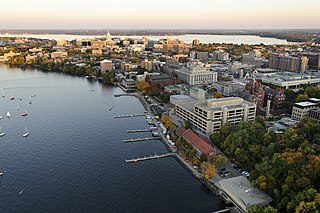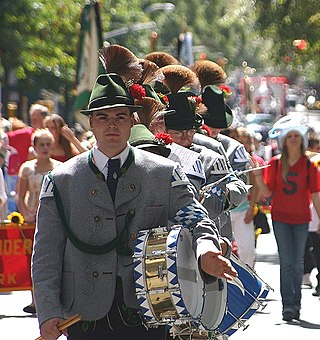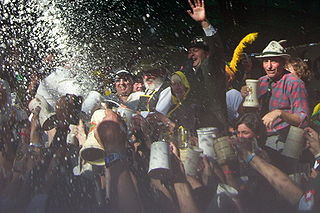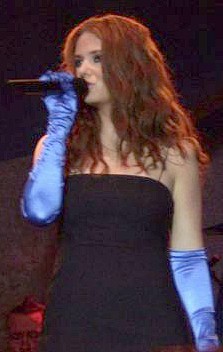
Wisconsin is a state in the Great Lakes region of the Upper Midwest of the United States. It borders Minnesota to the west, Iowa to the southwest, Illinois to the south, Lake Michigan to the east, Michigan to the northeast, and Lake Superior to the north. With a population of about 6 million and an area of about 65,500 square miles, Wisconsin is the 20th-largest state by population and the 23rd-largest by area. It has 72 counties. Its most populous city is Milwaukee; its capital and second-most populous city is Madison. Other urban areas include Green Bay, Kenosha, Racine, Eau Claire, and the Fox Cities.

Summerfest is an annual music festival held in downtown Milwaukee, Wisconsin. First held in 1968, Summerfest is located at Henry Maier Festival Park, adjacent to Lake Michigan and Milwaukee's Third Ward business district. Summerfest is known as "The World's Largest Music Festival", a title certified by Guinness World Records in 1999,.

Milwaukee is the most populous city in the U.S. state of Wisconsin and the county seat of Milwaukee County. With a population of 577,222 at the 2020 census, Milwaukee is the 31st-most populous city in the United States and the fifth-most populous city in the Midwest. It is the central city of the Milwaukee metropolitan area, the 40th-most populous metro area in the U.S. with 1.57 million residents.

Madison, officially the City of Madison, is the capital city of the U.S. state of Wisconsin and the county seat of Dane County. The population was 269,840 as of the 2020 census, making it the second-most populous city in Wisconsin, after Milwaukee, and the 77th-most populous in the United States. The Madison metropolitan area had a population of 680,796. The heart of the city is located on an isthmus, and its city limits surround five lakes: Lake Mendota, Lake Monona, Lake Wingra, Lake Kegonsa and Lake Waubesa. Madison was founded in 1836 and is named after American Founding Father and President James Madison.

Frankenmuth is a city in Saginaw County in the U.S. state of Michigan. The population was 4,987 at the 2020 census. The city is surrounded by Frankenmuth Township.

Over 50 million Americans claim German ancestry, which made them the largest single claimed ancestry group in the United States until 2020. Around 1.06 million people in the United States speak the German language at home. It is the second most spoken language in North Dakota and is the third most spoken language in 16 other states.

German Americans are Americans who have full or partial German ancestry.

Polish Americans are Americans who either have total or partial Polish ancestry, or are citizens of the Republic of Poland. There are an estimated 8.81 million self-identified Polish Americans, representing about 2.67% of the U.S. population, according to the 2021 American Community Survey conducted by the U.S. Census Bureau.

Von Steuben Day is a holiday traditionally held on a weekend in mid-September, celebrating the Prussian-born Baron Friedrich von Steuben, who arrived in the United States as a volunteer offering his services to General George Washington in the American Revolutionary War. Von Steuben is still regarded as one of the most important German Americans, as his training of the young American troops made victory against the British possible. Thus, his work helped gain independence for the United States of America. The day is generally considered the German-American event of the year, and many participants wear tracht costumes, including dirndls and lederhosen, to celebrate their heritage. Celebrations focus on parades where participants march, dance, and play music.

Lincoln Square on the North Side of Chicago, Illinois, is one of the city's 77 community areas. It encompasses the smaller neighborhoods of Ravenswood, Ravenswood Gardens, Bowmanville, Budlong Woods, as well as Lincoln Square itself.

Milwaukee Irish Fest is a yearly Irish-American festival held at the Henry Maier Festival Park, on Lake Michigan, United States, every third weekend in August. Over 130,000 people attend the Fest each year to watch nearly 250 acts on 17 stages. The four-day festival started in 1981, founded by Edward J. Ward. Irish Fest is the largest of the ethnic festivals held at the Summerfest grounds which report attendance, and holds claim to the largest celebration of Irish Culture in the world.

Kitchener–Waterloo Oktoberfest is an festival in the twin cities of Kitchener–Waterloo, Ontario, Canada. Based on the original German Oktoberfest, it is billed as Canada's Greatest Bavarian Festival, and is the second-largest Oktoberfest in the world. It is held every October, starting on the Friday before Canadian Thanksgiving and running until the Saturday after. Estimates indicate that the event attracts roughly 700,000 visitors to Waterloo Region, Ontario every year.

Polish Fest is an annual ethnic festival held at the Henry Maier Festival Park in Milwaukee, Wisconsin, and was established in 1982. One of the largest Polish festivals in the United States, it attracts Polish Americans from all over Wisconsin and nearby Chicago, who come to celebrate Polish culture through music, food and entertainment.

Czech Americans, known in the 19th and early 20th century as Bohemian Americans, are citizens of the United States whose ancestry is wholly or partly originate from the Czech lands, a term which refers to the majority of the traditional lands of the Bohemian Crown, namely Bohemia, Moravia and Czech Silesia. These lands over time have been governed by a variety of states, including the Kingdom of Bohemia, the Austrian Empire, Czechoslovakia, and the Czech Republic also known by its short-form name, Czechia. Germans from the Czech lands who emigrated to the United States are usually identified as German Americans, or, more specifically, as Americans of German Bohemian descent. According to the 2000 U.S. census, there are 1,262,527 Americans of full or partial Czech descent, in addition to 441,403 persons who list their ancestry as Czechoslovak. Historical information about Czechs in America is available thanks to people such as Mila Rechcigl.

The Oktoberfest is a two-week festival held each year in Munich, Germany during late September and early October. It is attended by six million people each year and has inspired numerous similar events using the name Oktoberfest in Germany and around the world, many of which were founded by German immigrants or their descendants.
Music tourism is the act of visiting a city or town to see a music festival or other performances. This sort of tourism is particularly important to small villages such as Glastonbury, as well as bigger cities like Glasgow. The fairly recent jam band phenomenon is a contemporary example that encourages music tourism. Music festivals are attended by many tourists annually. Taylor Swift's Eras Tour and Coldplay's Music of the Spheres World Tour are prominent instances of music tourism with their impact on global economy.

PrideFest is an annual gay pride event held at the Henry Maier Festival Park in Milwaukee, Wisconsin on the second weekend of June.
The German American National Congress is a national German-American nonprofit organization in the United States founded in 1959. It was established to unite Americans of Germanic descent, while preserving their heritage and traditions. With over 30 chapters and more than 100 associated members throughout the country, DANK is the largest organization of German-Americans.

There have been a variety of ethnic groups in Baltimore, Maryland and its surrounding area for 12,000 years. Prior to European colonization, various Native American nations have lived in the Baltimore area for nearly 3 millennia, with the earliest known Native inhabitants dating to the 10th millennium BCE. Following Baltimore's foundation as a subdivision of the Province of Maryland by British colonial authorities in 1661, the city became home to numerous European settlers and immigrants and their African slaves. Since the first English settlers arrived, substantial immigration from all over Europe, the presence of a deeply rooted community of free black people that was the largest in the pre-Civil War United States, out-migration of African-Americans from the Deep South, out-migration of White Southerners from Appalachia, out-migration of Native Americans from the Southeast such as the Lumbee and the Cherokee, and new waves of more recent immigrants from Latin America, the Caribbean, Asia and Africa have added layers of complexity to the workforce and culture of Baltimore, as well as the religious and ethnic fabric of the city. Baltimore's culture has been described as "the blending of Southern culture and [African-American] migration, Northern industry, and the influx of European immigrants—first mixing at the port and its neighborhoods...Baltimore’s character, it’s uniqueness, the dialect, all of it, is a kind of amalgamation of these very different things coming together—with a little Appalachia thrown in...It’s all threaded through these neighborhoods", according to the American studies academic Mary Rizzo.

Milwaukee, just like the state of Wisconsin itself, has one of the largest German-American populations in the United States, with an estimated 40% people claiming German ancestry. In addition, the Greater Milwaukee Area has over 60% self-identified German-Americans.



















